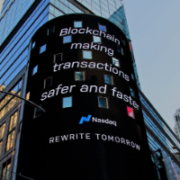Blockchain: Some remarkable announcements part I
| 29-08-2016 | Carlo de Meijer |
 While Blockchain is seen by many as a network phenomenon that needs large market participation, collaboration and interoperability to succeed, both R3CEV and a group of four large global banks came with announcements that are at least a bit remarkable. The bank-backed consortium had filed for a patent of Corda (which is contradictory to the need for open standards and protocols), and at the same time a small group of R3 consortium members have expressed their wish to create their own digital currency (while large collaboration is needed).
While Blockchain is seen by many as a network phenomenon that needs large market participation, collaboration and interoperability to succeed, both R3CEV and a group of four large global banks came with announcements that are at least a bit remarkable. The bank-backed consortium had filed for a patent of Corda (which is contradictory to the need for open standards and protocols), and at the same time a small group of R3 consortium members have expressed their wish to create their own digital currency (while large collaboration is needed).
R3 and Corda patent
R3CEV, the bank-backed consortium this week announced that it had filed for a patent of Corda, the distributed ledger software that underlies its new project ‘Concord’.
Some critics have argued that blockchain-based solutions should not have patents attached. That could not only hinder innovation in the field of distributed ledgers technology over the coming years. But it could also stand in the way of a more massive adoption of this technology.
R3, however sees it different and says that “although Concord will resemble other platforms working on blockchain technology the underlying software Corda has/offers enough unique features to justify a patent”. “Corda is just one element of the wider Condor platform”.
Corda White Paper
In the meantime R3 also released its first Whitepaper on Corda. It gives an introductory, non-technical overview that explain its vision, some design choices and outlines the key concepts underpinning the Condor platform.
The Corda project that was announced in April this year, aims to create the software that would be central to its wider blockchain-inspired shared ledger development project, called Condor.
In this Whitepaper it is explained how R3 set themselves the challenge of starting with the various pain points in the financial industry’s: duplicated, inconsistent data and business logic and redundant business processes – and asked themselves “if they could apply breakthroughs in distributed ledger and blockchain technology to solve them”.
Corda is in fact the outcome of the analysis R3 and the participating banks made on how to achieve as many of the benefits of distributed ledger and blockchain technology as possible “but in a way that is sympathic to and addresses the needs of regulated financial institutions”.
What is Concord?
Concord is aimed to become a distributed ledger platform that has been in development for over a year now. Thereby various challenges are assessed such as governance, internal record keeping and regulatory reporting across the financial services marketplace.
R3 describes Concord as a ‘shared-services model’ that still maintains privacy for banks. Concord aims to become a universal software platform connecting bank operations, allowing companies to run high-scale financial applications on permissioned networks across organisations and internally.
This platform that will be designed to record and manage important, financial agreements (read: smart contracts) between regulated financial institutions, aims to digitalise so-called back and mid-office functions, including trade clearing and settling securities trades, asset registry, reconciliation, and even the recording of cash balances.
By moving these middle and back office functions to a secure cloud-based ledger, R3 en its members hope that Concord will significantly streamline present cumbersome operations, and lower the costs of maintain them. By doing that huge cost savings could be realised (billions of dollars).
Traject
A version of Concord is expected to be launched in the next several months. A small number of member banks will begin testing the system early 2017, with an so-called “alpha” version planned to appear by the middle of next year. “We need to make this real to business users in 2017”, according to R3.
It however will be up to consortium members to decide whether to use it or not. Current bank members of the consortium haven’t (yet) committed to using the new Concord platform and aren’t bound to use it. Nevertheless they have invested money and resources helping build it and also have input into Concord’s specifications.
Concord versus Ethereum
Concord resembles Ethereum, another distributed ledger platform, in a number of ways. Just like Ethereum Concord is viewed as a platform that will allow developers to build any variety of applications. But Concord is tailored expressly for financial institutions, and so has different features and functions.
Perhaps the most important difference between Concord and Ethereum is the way transactions will be recorded. With Ethereum every transactions is recorded, verified and disclosed immediately in their respective public, distributed ledgers.
With Concord, while the transaction is verified via a distributed ledger, it is not publicly disclosed, maintaining the confidentiality that was a key concern of R3’s member banks. The details are shared only by the parties involved, or parties to whom they give access.

Economist and researcher









